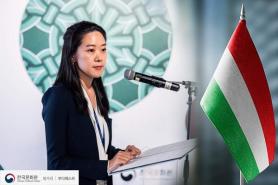
[Aju News DB]
South Korean TV series continued to create a sensation at home and abroad by experimenting with new genres and discovering the potential of some previously lesser-known stars.
The year started out with the success of the tvN series "Reply 1988," which carried over from last year to post a record 19.6 percent in viewership ratings, the highest ever for a drama on a cable channel.
Based on the lives of five ordinary families living in 1980s Seoul, the series evoked nostalgia for the past and led to a boom in sales of retro goods.
The talk of the year, though, was definitely "Descendants of the Sun." The KBS 2TV series raised a storm almost simultaneously in South Korea and China with its unique combination of military, medical, romance and disaster genres, but most of all with its lead actor Song Joong-ki. In the role of the tough but hopelessly romantic special forces soldier Yoo Si-jin, Song shot to stardom and firmly established himself as a leader of the Korean pop culture craze known as "hallyu," or the Korean Wave.
So smitten were the ladies in China that they began to call themselves "Song's wife" or him "the nation's husband." Beijing even issued a call for restraint.
The drama's enormous popularity got producers and TV critics analyzing what exactly set it apart from its predecessors. Few series in the Wednesday-Thursday night time slot were able to cross 10 percent in viewership ratings in recent years, but "Descendants" climbed the charts before finally peaking at 38.8 percent in its 16th and last episode in April.
Many attributed the success to the synergy of the co-writers Kim Eun-sook and Kim Won-seok. Known as the "queen of rom-coms," the former had been a hit maker for years and built an impressive portfolio of dramas ranging from "Lovers in Paris" and "Secret Garden" to "A Gentleman's Dignity" and "The Heirs." When she mixed her romance with the trademark action and masculinity of Kim Won-seok, "it became very entertaining," as the writer herself said.'
Budget and technical issues came under the spotlight, too.
In a departure from previous TV series, "Descendants" was filmed entirely in advance to enable simultaneous broadcasts in South Korea and China. Under Chinese government regulations, all dramas have to be screened prior to airing, and the traditional film-as-you-go method used by Korean producers causes unavoidable delays in a drama's China release.
In the case of "Descendants," the simultaneous broadcasts appeared to fan the explosive responses in both countries, which led other dramas to follow suit. Unfortunately for them, none of them came near the success of "Descendants." "Uncontrollably Fond," a pre-recorded drama that was highly anticipated for its lead actors Kim Woo-bin and Bae Suzy, even flopped.
"Descendants" was sold for between US$250,000 and $300,000 per episode to the Chinese online video platform iQiyi, according to estimates by industry experts. Production was estimated to have cost some 13 billion won ($11 million). Under these estimates, more than a third of the drama's production cost was covered by so-called "China money" in another testament to the growing influence of Chinese buyers in the Korean culture market.
Then, about halfway into the year, the K-drama industry faced a watershed moment. It came in the unusual form of a political dispute between South Korea and China after Seoul and Washington announced plans to deploy a US anti-missile system on South Korean soil.
China openly expressed its anger, saying the system would destabilize the regional security balance and undermine its national interests. The allies stuck to their decision in July, making repeated assurances that the Terminal High Altitude Area Defense (THAAD) system was aimed only at deterring North Korea's nuclear and missile threats.'
Reports soon emerged that Beijing had issued a tacit ban on all Korean cultural content. Various Korean celebrities were either dropped from their programs in China or forced to postpone their scheduled events in the neighboring country.
Beijing's apparent retaliation has continued through the end of the year.
Two recent TV series -- "Guardian: The Lonely and Great God" and "Legend of the Blue Sea" -- could have fetched at least 10 billion won each from Chinese buyers under normal circumstances due to the popularity of their writers and cast, according to industry sources. The political row, however, has brought all related negotiations to a halt.
(Yonhap)
Copyright ⓒ Aju Press All rights reserved.



![[OPINION] Deciphering Hallyus Popularity](https://image.ajunews.com/content/image/2023/03/03/20230303153345186950_278_163.jpg)